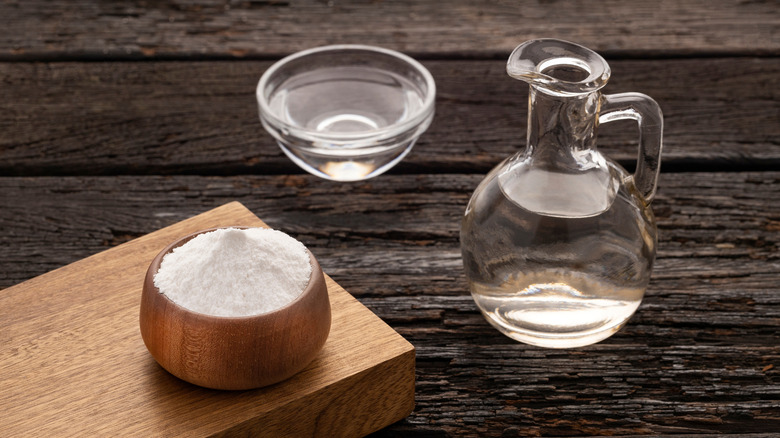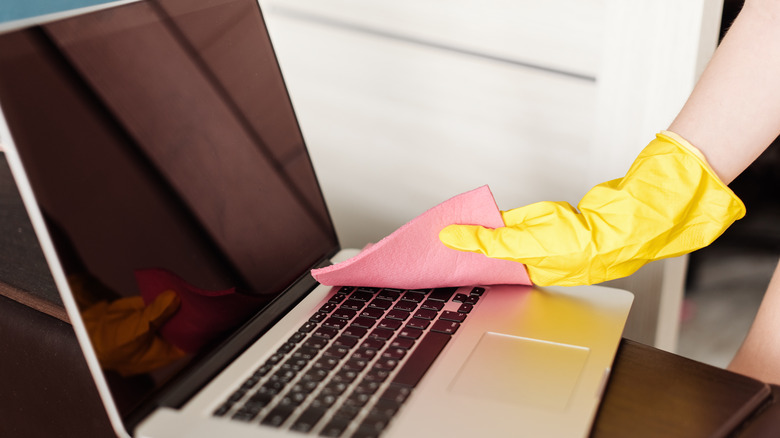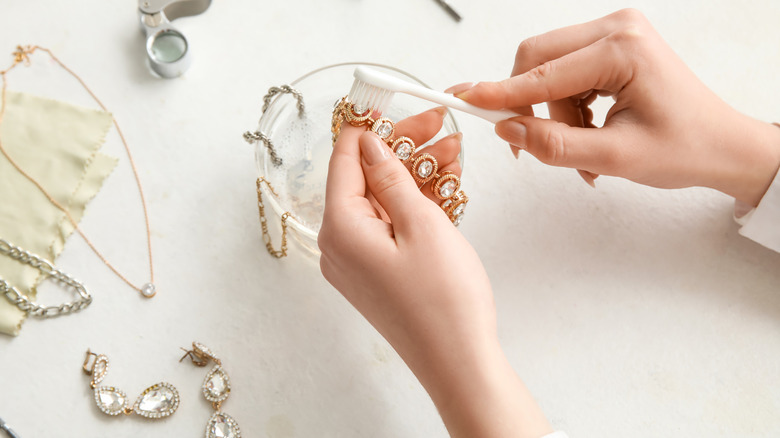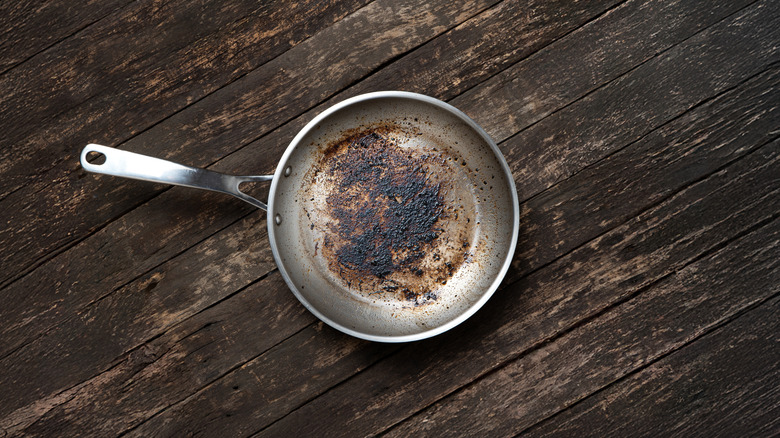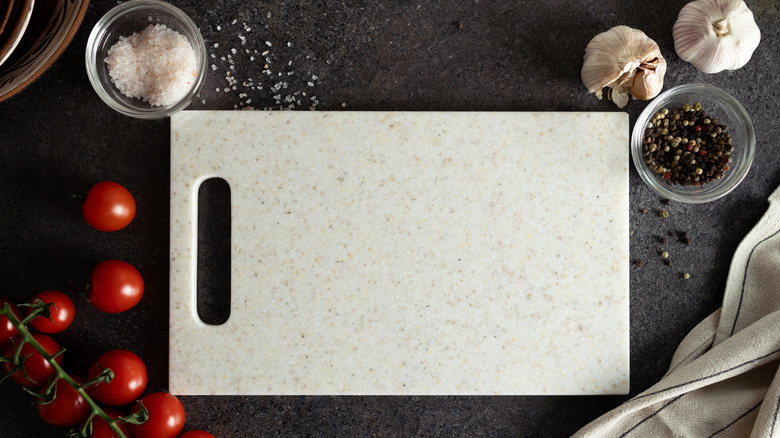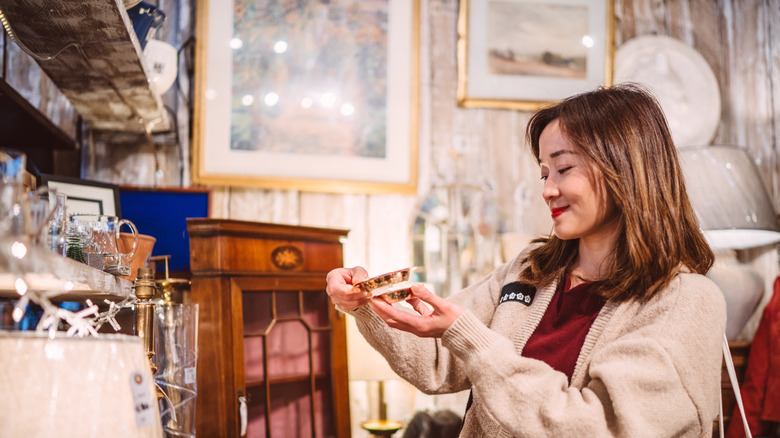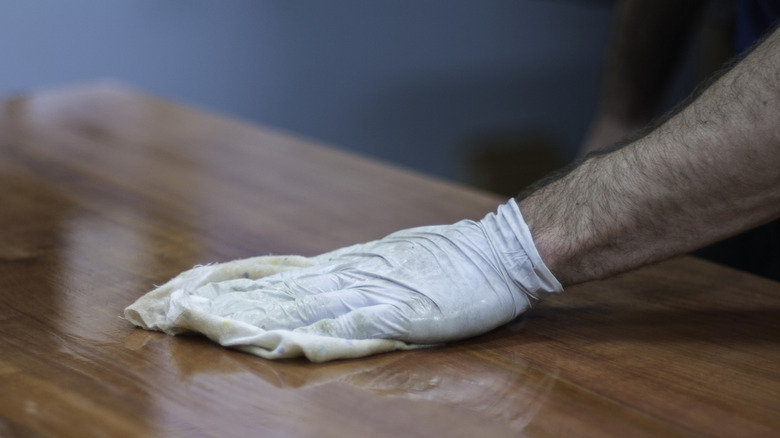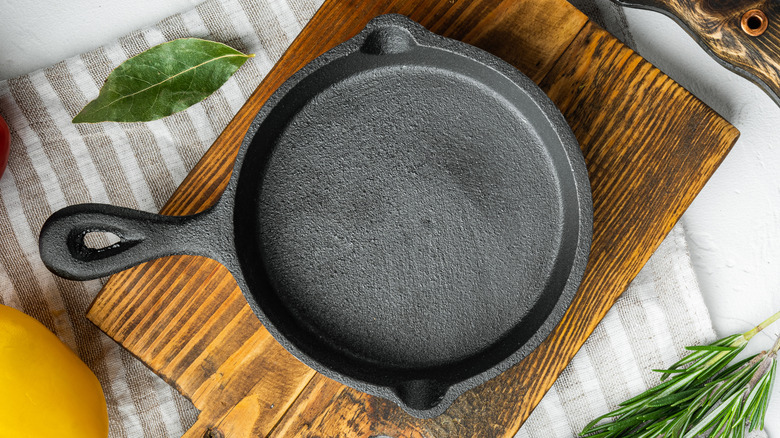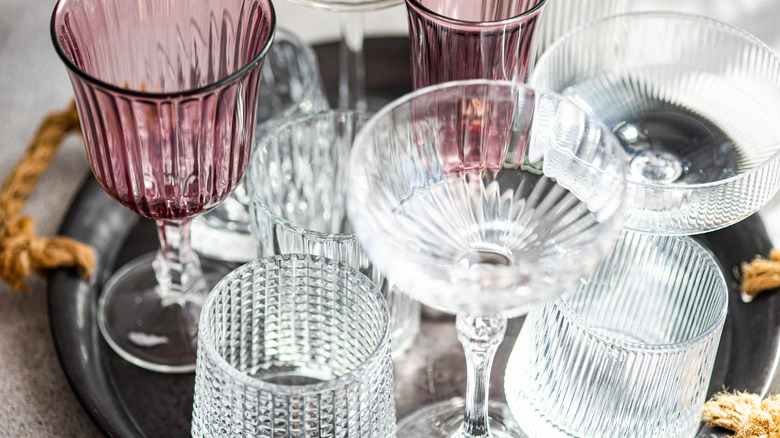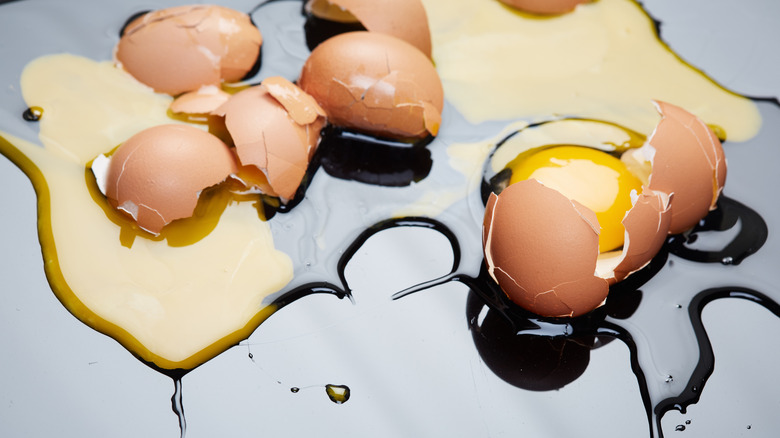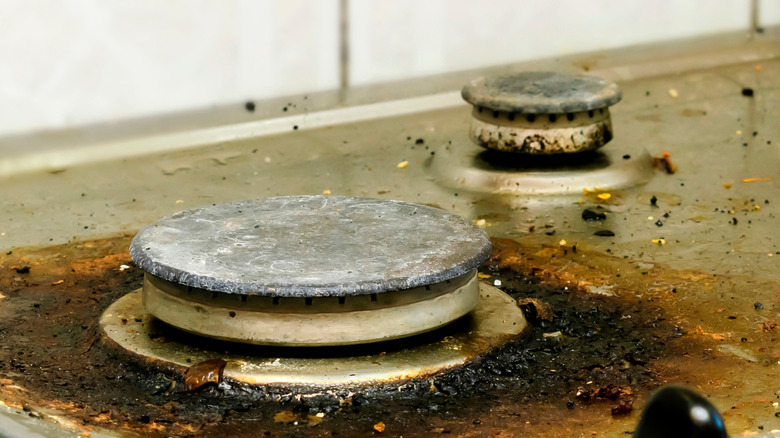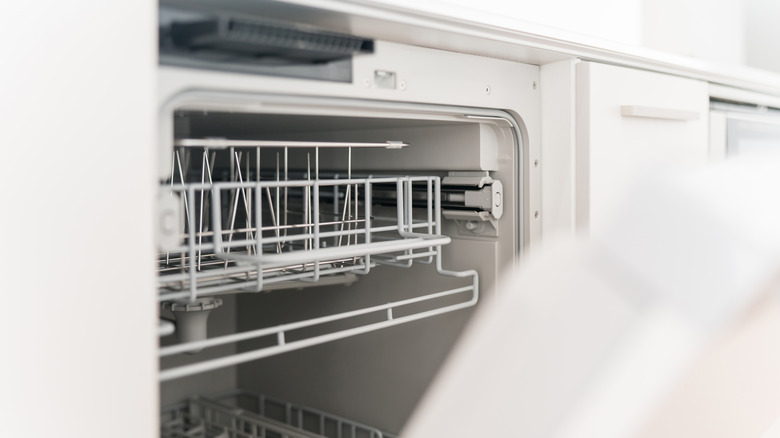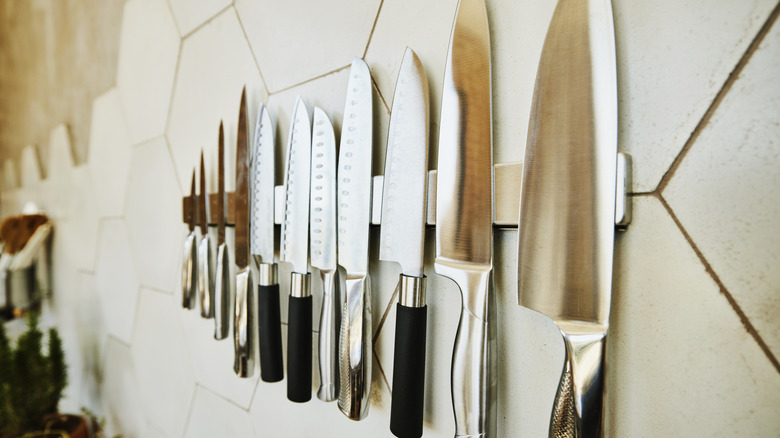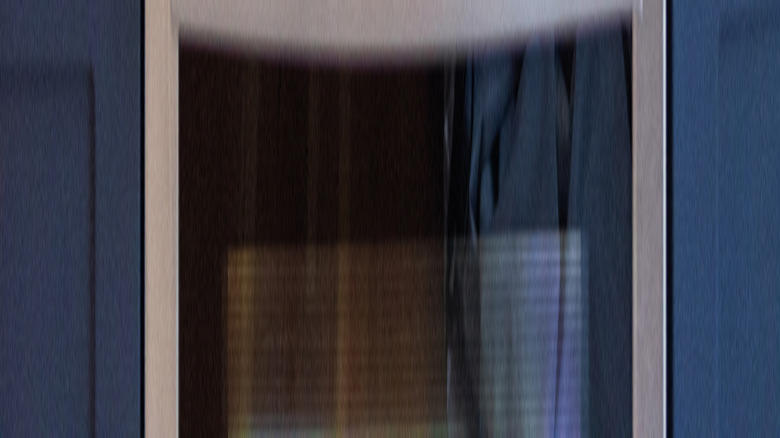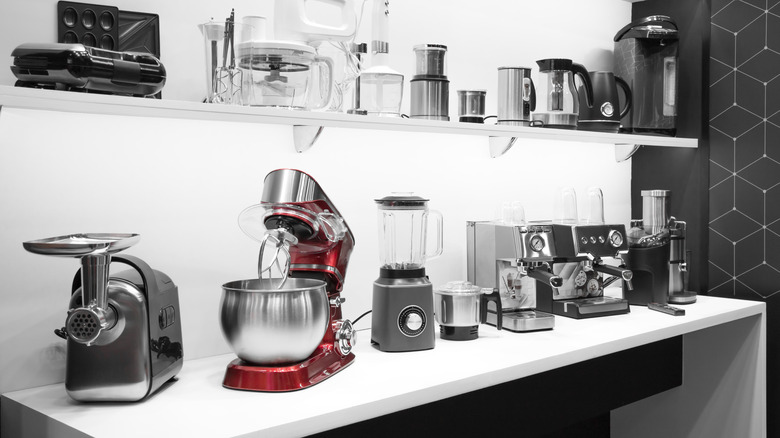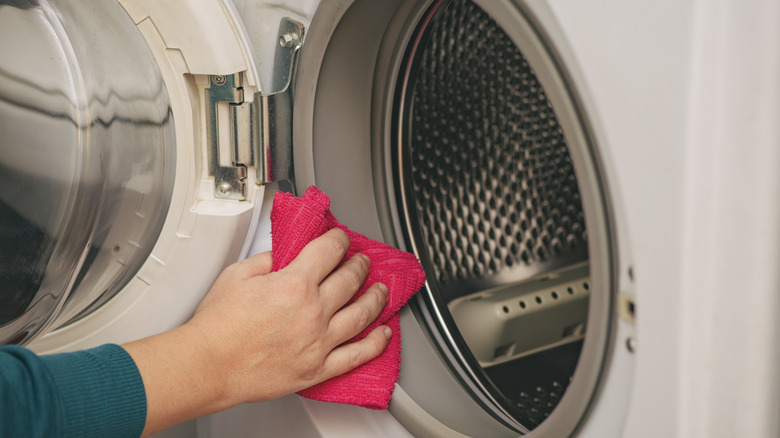Avoid Cleaning These 16 Things With A Mix Of Baking Soda And Vinegar At All Costs
Vinegar and baking soda are widely recognized for their cleaning properties, both on their own and together. With so many vinegar and baking soda hacks that are worth trying, it can be tempting to mix these ingredients together. They are staple cleaners in many homes for accomplishing tough cleaning jobs without the use of harmful chemicals. While it's true that combining vinegar and baking soda can be exceptionally effective for some cleaning tasks, like cleaning certain types of drains, there are others you should avoid completely. In fact, there are a few things you should know before cleaning with a mixture of baking soda and vinegar at all.
For example, the two chemicals actually cancel each other out. That fizzy reaction is the result of an acid (vinegar) coming into contact with a base (baking soda), and once they've mixed, the result is basically just salt water. When cleaning with both ingredients, there are actually very few, specific, useful applications because the chemical reaction of the bubbles is really the only thing doing any work. In addition, each ingredient can cause damage to certain surfaces and finishes, like wood, stone, stainless steel, and aluminum, leaving you with an even bigger problem to deal with than stuck-on grime or odors. They can also wreak havoc on appliances, electronics, and other household items. Here's a look at 16 items you should avoid cleaning with a mixture of baking soda and vinegar at all costs.
Electronics
Both vinegar and baking soda are known to damage electronic devices. Vinegar can immediately damage anything with a screen because the acidity can decrease both the anti-glare and touch screen features. On the other hand, baking soda is slightly abrasive, which is why cleaning experts recommend not using it on electronics. The abrasive nature can tarnish screens or damage other components in any type of electronic device. This includes computers, TVs, tablets, keyboards, mice, or any other item with electrical components.
Jewelry
Jewelry is another item that should never be cleaned with vinegar or baking soda, and certainly not both. Jewelers highly advise against cleaning jewelry with vinegar, regardless of the materials it is made out of, because of its acidity. Vinegar can easily damage the finish and tarnish patina and gemstones, ultimately impacting the value of the piece. Similarly, the abrasive quality of baking soda can lead to scratching on gold and silver pieces and damage to certain protective coatings.
Aluminum
There are many household items that are made of aluminum, including pots, pans, decor, and even some drains. While vinegar may be one of the best ways to clean aluminum, baking soda is not recommended because it can lead to pitting in the metal. For this reason, it is essential to be aware of what type of metal your items are made of before attempting to clean them using any abrasive substances, especially if you are considering using a mix of vinegar and baking soda to deodorize or unclog a drain.
Natural stone
The mixture of vinegar and baking soda should also be avoided on any type of natural stone surface, including counters, architectural features, or even cutting boards. This is yet another material that does not take kindly to either ingredient. Baking soda can scratch the surface and leave residue in porous stones, while vinegar can dull the surface of natural stone or remove protective coating on finished counters or other stone surfaces. Some stone surfaces to be especially careful with include granite, marble, and limestone.
Wood surfaces
Just like with stone surfaces, wood is a porous surface that does not take kindly to the abrasive and acidic mixture of vinegar and baking soda. It doesn't matter if the wood is finished or unfinished; vinegar and baking soda can cause unsightly damage that can be costly to fix. Baking soda is known to cause scratches to all types of wood surfaces, including floors, furniture, cabinets, and more. Vinegar can also cause scratches, remove finishes, and dull the surface. When it comes to wood floors, trying to clean with these items can even void your warranty.
Antiques
Similar to the damage that vinegar and baking soda can cause to jewelry, cleaning antiques with the wrong products can cause irreparable damage to these valuable items. In general, it is recommended to have antiques cleaned by professionals rather than attempting to clean them on your own. A vinegar and baking soda mixture can easily scratch the surface, remove protective coatings, or cause other serious damage. While some professionals recommend using diluted vinegar to clean certain pieces, it is essential to be aware of the cleaning recommendations for your specific items and never mix vinegar with baking soda.
Waxed furniture
Of course, you should probably avoid cleaning any wooden furniture, including waxed furniture, with vinegar and baking soda, but it is worth noting that the level of damage differs from natural wood surfaces. Waxed furniture can easily be scratched with baking soda, just like with natural wood. Vinegar, however, will completely dissolve and remove the wax finish. In fact, it is even a recommended product for dewaxing surfaces. In other words, vinegar and baking soda are not suitable for cleaning waxed furniture, but they are suitable for preparing to resurface it.
Cast Iron
Cast iron is used to make sturdy skillets and pans, but that doesn't mean it can stand up to improper cleaning practices. A mixture of vinegar and baking soda is not going to do you any favors if you use it for regular cleaning. Instead, consider trying the unexpected potato hack that will do wonders for your dirty cast iron skillets. Both baking soda and vinegar will actually remove the seasoning from the cast iron, which can mean more work for you. Vinegar can, however, be helpful for removing rust, although the same doesn't go for baking soda.
Glass
Whether you are trying to clean spots from drinking glasses, scrub soap scum from windows or mirrors, or remove odors from glass jars, baking soda and vinegar is not the answer. As with many other items, the baking soda can easily scratch the surface, leaving you with messed up mirrors and damaged glassware. Vinegar can be used as an ingredient in glass cleaner, but it needs to be diluted. If you are trying to remove odors, you may be interested to find that the secret to clean-smelling glass jars is hiding in your medicine cabinet.
Egg spills
It can be tempting to reach for vinegar and baking soda to clean up kitchen spills, but you don't want to clean up egg spills with vinegar. It is widely known that the acidity of vinegar speeds up the coagulation process of egg whites, making a mushy, hardened mess that is actually harder to clean. Salt is a much better solution for cleaning up raw eggs than a vinegar mixture. After the area is cleaned and dried, you could still consider using baking soda to remove any residual odors.
Deep layers of grease
Many people, especially on social media, believe that baking soda and vinegar are great for degreasing. The thing is, they each can be, on their own. Together, the neutralizing action has very little impact on thick grease. The confusion comes from the fact that the mixture can be effective in removing the thin residue left behind from grease. Using it to clean deep layers of grease, on the other hand, will probably leave you with a bigger mess than you started with. Instead, reach for a bit of dish soap to get the job done.
Dishwashers
Another common belief about vinegar and baking soda is that they can help to clean and deodorize dishwashers in place of dishwasher cleaning products. This is only partially true. First and foremost, there are cleaning recommendations from certain brands that suggest using baking soda or vinegar, but never together. Baking soda is fine to use on its own for deodorizing. However, it's best to avoid vinegar because it is not safe for many models due to the corrosive effect it can have on the appliance's rubber parts.
Kitchen knives
Unless you're willing to cause damage, cleaning knives with any type of vinegar mixture should be avoided at all costs. Baking soda may be fine if you are trying to get rid of rust on a blade, but vinegar can easily cause corrosion and pitting. Some types of metal are more susceptible to damage from vinegar, but it is best to avoid using it for any knives to avoid dulling the blade.
Stove tops
There are two issues with cleaning stove tops with baking soda and vinegar. First, glass countertops present the same issues as cleaning any other type of glass in the form of scratching risks. Second, you aren't actually going to be removing the grease, especially if it is caked on. If your countertop is not glass or ceramic, you could try baking soda alone. But, ultimately, dish soap is a more effective cleaner for stoves than baking soda, vinegar, or a mixture of the two.
Small appliances
Small appliances don't take kindly to a baking soda and vinegar mixture, either. This is because they are generally made of several different materials and variable grades of metal. Cleaning rubber parts or low-grade metal with vinegar can lead to corrosion and rusting that can leave lasting damage. Baking soda is generally safe, but it could cause scratching or cloudy residue on the glass or other delicate materials.
Washing machines
While there are some laundry applications for both baking soda and vinegar, they should not be used together in washing machines. In addition, if you are going to use either one in your laundry, it is not recommended for regular use. Baking soda and vinegar together can cause damage to the washing machine that could end up being disastrous and expensive. Using the two together is essentially useless in laundry because they will neutralize each other. In addition, baking soda can damage certain fabrics, while vinegar can damage rubber seals in the machine, leading to leaks.
